De Franse schrijfster Eliette Abécassis werd geboren op 27 januari 1969 in Straatsburg. Zie ook alle tags voor Eliette Abécassis op dit blog.
Uit: La dernière tribu
“Et moi, j’étais Ary, le lion, le Messie des esséniens, et mon cœur, tel l’oiseau qui a perdu son nid, soupirait, languissait après le parvis du Temple. Je ne cessais de tourner mes prières vers Jérusalem. En ma grande prière du matin, de midi et du soir, je faisais des supplications pour le retour des exilés et la restauration de la Cité de la Paix. Mes jours de jeûne et mes jours de deuil étaient des anniversaires de nos désastres nationaux, et les services les plus solennels de notre rituel concluaient par l’invocation : l’an prochain à Jérusalem.
(…)
“Ô mes amis, vous qui me suivez, ô vous qui savez. Comment vous dire ? Comment trouver les mots pour exprimer ce que j’ai ressenti ? Je n’avais jamais connu telle force, telle intensité, telle joie, telle unité que celle-ci, il ne m’avait jamais été donné de contempler une telle beauté, une telle immensité, une telle grandeur, sublime entre toutes, réelle et irréelle, terrestre et surhumaine, antique et actuelle, évanescente et éternelle, profonde et céleste, immense et minuscule, ordinaire et extraordinaire. Comment dire ? Comment le comprendre ?”
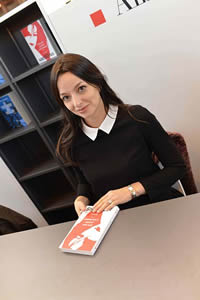
Eliette Abécassis (Straatsburg, 27 januari 1969)
De Canadese Schrijver Mordecai Richler werd geboren op 27 januari 1931 in Montreal. Zie ook alle tags voor Mordecai Richler op dit blog.
Uit: Barney’s version
“Yes, carbon paper, if any of you out there are old enough to remember what that was. Why, in those days we not only used carbon paper, but when you phoned somebody you actually got an answer from a human being on the other end, not an answering machine with a ho, ho, ho message. In those olden times you didn’t have to be a space scientist to manage the gadget that flicked your TV on and off, that ridiculous thingamabob that now comes with twenty push buttons, God knows what for. Doctors made house calls. Rabbis were guys. Kids were raised by their moms instead of in child-care pens like piglets. Software meant haberdashery. There wasn’t a different dentist for gums, molars, fillings, and extractions — one nerd managed the lot. If a waiter spilled hot soup on your date, the manager offered to pay her cleaning bill and sent over drinks, and she didn’t sue for a kazillion dollars, claiming “loss of enjoyment of life”. If the restaurant was Italian it still served something called spaghetti, often with meatballs. It was not yet pasta with smoked salmon, or linguini in all the colours of the rainbow, or penne topped with a vegeterian steaming pile that looked like dog sick. I’m ranting again. Digressing. Sorry about that.”
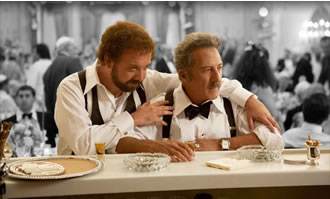
Mordecai Richler (27 januari 1931 – 3 juli 2001)
Scene uit de film “ Barney’s version“ uit 2010 met Paul Giamatti en Dustin Hoffman,
De Amerikaanse schrijver Ethan Mordden werd geboren op 27 januari 1947 in Pennsylvania. Zie ook alle tags voor Ethan Mordden op dit blog.
Uit: Love Song. The Lives of Kurt Weill and Lotte Lenya
“She was born first, about a year and a half before him, in Vienna, on October 18, 1898. Karoline Wilhelmine Charlotte Blamauer was the daughter of a coachman, Franz Blamauer, and a laundress, the former Johanna Teuschl. If young Linnerl—a standard nickname for Karoline—was to captivate men, as her mother predicted, it may have been one of those traits acquired by imitation, for her mother was a pet of the local lads. “Frau Blamauer sees pants on a clothesline,” the neighbors would carol, “and she’s pregnant.” But of her many gestations only five children were born alive, three girls and two boys.
The firstborn, Karoline, died at the age of four, and the future Lotte Lenya was named after her. There were as well her older brother, Franz; her younger brother, Max; and her younger sister, Maria. It was Linnerl who attracted their father’s particular attention, for he had loved his dead Karoline and hated the one who replaced her. Young Linnerl lived in terror in the Blamauers’ small apartment, in a five-storey block of masonry way out to the southwest of Vienna’s “inner city,” on the southern edge of the district of Penzing, where it borders Hietzing. The area was so distant from Vienna’s core area around St. Stephen’s Cathedral that from the window of the Blamauers’ kitchen one could see Schönbrunn, the summer palace of Austria’s royal house, the Hapsburgs.
It is an odd trick of the abusive parent to select one child in particular to destroy. The others are ignored or even favored, and Franz singled out the surviving Linnerl for intimidation with the constant and very real threat of violence. If he wanted a stein of beer from the corner tavern, it was always Linnerl who was sent to collect it and slapped if he suspected that she had spilled any of it. When he barged into the apartment after a night of carousing and demanded a song, it was Linnerl who was pulled out of bed—a wooden box with a removable cover for use as an ironing board or in preparing dough for noodles—and forced to sing for him.”
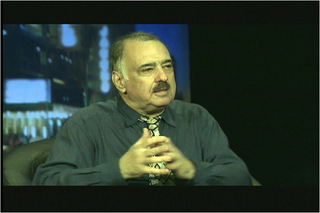
Ethan Mordden (Pennsylvania, 27 januari 1947)
De Belgische, Franstalige, schrijver Guy Vaes werd geboren op 27 januari 1927 in Antwerpen. Zie ook alle tags voor Guy Vaes op dit blog. Guy Vaes overleed op 27 februari van het afgelopen jaar op 85-jarige leeftijd.
Uit : Une descente aux Enfers. À propos de Hugo von Hofmannsthal
“L’univers des poèmes du jeune Hofmannsthal se partageait encore entre un Haut et un Bas sans compromis. Y succéda, tel l’adulte émergeant de l’adolescent, l’apprentissage de ce qui apparaît à l’écrivain comme étant le réel, autrement dit ce qui est contrainte, opacité mauvaise, objet de désarroi et de cruauté. Sans doute doit-il cette vue dont le pessimisme rejoint l’aversion, à son expérience militaire à Göding, « une morne garnison de Marovie ». L’ennui et la vulgarité qui y règnent, le souvenir des « grandes cours vides des casernes » imprègnent le Conte de la 672e nuit, ainsi que la correspondance. Le passage de Hofmannsthal à la prose, davantage en prise directe avec sa part autobiographique, toujours ébranlée de tempêtes intimes, d’antagonismes que commandent le Haut et le Bas, réclamera de lui l’enracinement en des Märchen initiatiques et des souvenirs de voyages.
Dans ces derniers on voit, par moment, comment l’éloignement suscite son contraire : la proximité. Si le temps ne nous était pas mesuré, on pourrait établir une relation entre ce phénomène et le refus d’Odilon-Jean Périer de s’approprier l’objet de son amour.
Ce que la Grèce impartira à Hofmannsthal, c’est une lumière que j’oserais appeler définitive, et qui visite également la Provence à laquelle Cézanne doit son génie. Et cette lumière pérenne ne peut que renvoyer à l’intemporel, à cet état pour concevoir cette opération, il faudra que l’amateur de tableaux que fut Hofmannsthal — n’est-ce pas leur opacité qui le détourna du miroir, abîme où se
noie le regard ? — franchisse d’abord des échelons intermédiaires.”
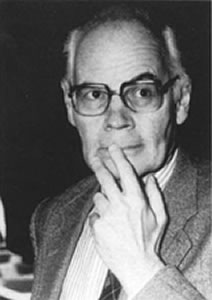
Guy Vaes (27 januari 1927 – 27 februari 2012)
De Duitse dichter en schrijver Bernd Jentzsch werd geboren op 27 januari 1940 in Plauen. Zie ook alle tags voor Bernd Jentzsch op dit blog.
Dicht am Boden
Die Frühe sprang auf die Beine wie ein Lamm
Und sah mich am Boden, auf allen vieren.
Uit:Die Neugründung des Literaturinstituts war eine Steißgeburt.
(Bernd Jentzsch im Gespräch mit André Hille)
“B. Jentzsch: Es gab einen öffentlichen Druck aus dem alten Literaturinstitut, aus, sagen wir es mal wertfrei, politisch linken Gruppen, Muschg in der Schweiz, Mayer in Tübingen, dann gab es eine Gruppe in Frankreich und so weiter. Und diese Konstellation hat dazu geführt, dass in Dresden ein Beschluss durchgegangen ist: Ja, es wird ein neues Institut geben. Aber die regierende CDU war wieder zu einem Teil dagegen, so dass das nur mit den Stimmen der Oppositions-SPD zustande kam, also das allein war schon eine knirschende Lage. Die Universität hat gesagt: Herr Gott, was sollen wir mit den Schreiberlingen? Die Kunst wurde dazwischen aufgerieben, die war für die Universität nicht interessant. Ich war im höchsten Gremium der Universität, da ging es um die Pferde der Veterinärmediziner und nicht um die Belange des Literaturinstituts. Die Neugründung des Literaturinstituts war eine Steißgeburt, ich will nicht sagen Missgeburt, das ist kein gutes Wort, aber es ist nicht das, was ich mir darunter vorgestellt habe. Es konnte auch nicht die Wiederbelebung des Becher-Instituts sein, in vieler Hinsicht nicht. Das Paradoxe ist, dass das alte Institut in der hochdurchorganisierten DDR wahrscheinlich mehr Spielraum hatte, als wir in der Nachwendezeit.”
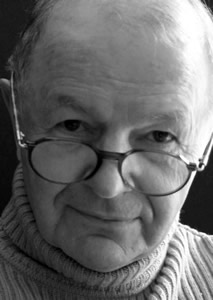
Bernd Jentzsch (Plauen, 27 januari 1940)
